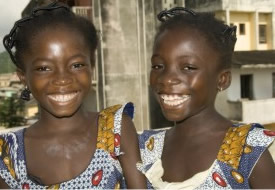|
|
|
|

Dixcove
| Situated on the shores of a rocky cove, Dixcove is a colourful and animated fishing town, dominated by the brightly white Fort Metal Cross, which was built by the British in 1692. Dixcove has a natural harbour that is big enough for small ships. As to be expected, fishing, fish processing and fish mongering are the main economic activities of the town. |
 |

- What to Do
- What to Eat and Where to Stay
- Getting There
- Fact File
- Tour the attractive Fort Metal Cross, discovering its history. The caretaker will tell you captivating stories of how the fort was built, its uses, and how it changed hands over time. He will take you to the dungeons and other rooms, as he tells the story. Savour the fascinating view of the old township and the busy fishing harbour, from the fort’s hilltop location.
- Hike or cycle to Busua. You will find yourself in palm plantations, where you might be fortunate to see palm wine being tapped (and if you meet the tapper, you may be able to sample some of his produce!).
- Discover the fascinating indigenous culture of the people of Dixcove. You will hear about gripping myths and rituals associated with the Kundum festival, and you will see some historical buildings, like the old colonial building with the ‘cooking pot’. If you are lucky, you may witness a traditional funeral, baby naming or marriage ceremony. As you go through town, don’t be overwhelmed by the smell of fish! At the harbour, you may be shown the various types of fish.
- If you are very adventurous, you can go on a fishing expedition with experienced local fishermen. On any day apart from Tuesday, you can join the fishermen in their colourful dugout canoes powered by outboard motors. On sea, you will see flying fish jumping out of the waves, and between September and December, you might even spot dolphins or small herds of whales. Feel free to help the crew draw in their nets, and end your day by eating a meal on the beach, made from the catch of the day.
- You can also join in the triumph as the local fishermen drag in their nets full of the day’s catch, amidst rhythmic traditional singing and drumming.
- Relax at one of the hangouts and small bars in the town. The legendary Jerry Garcia bar (Free Mind Spot) is highly recommended.
* To book a place on any tour, please register with the Town Tourism Development Committee.
Currently, there are no hotels in Dixcove, but there is one home stay in the community (and a new beach resort is being constructed behind Fort Metal Cross). You can eat at your home stay, or buy a dish from one of the local food vendors. The most popular dishes are fufu (large dumplings made from pounded cassava and plantain) and kenkey (steamed balls of fermented corn, wrapped in banana leaves), served with delicious stews and soups. Since fish – and especially tuna - abounds in Dixcove, most meals are prepared with fresh or smoked fish.
| Hotel/Lodge |
Ceto Self Catering, www.cetoghana.com, Near Achoa, west of Dixcove
|
| Remark(s) |
Self catering beach rental house |
| Room Range |
2 bedrooms (double and twin) with fans, bathroom, open plan kitchen and living area, first floor, open air balcony, and veranda |
Room Rates
(GH¢ per night)* |
From 30 per person per night |
| Hotel/Lodge |
Fort Metal Cross, Dixcove
|
| Room Range |
Upmarket chalets in the grounds by the sea, (yet to be completed)
|
| Hotel/Lodge |
Quiet Storm Home Stay, Tel: 0246 225 772
|
| |
| Meals & Drinks |
Price Range (GH¢)* |
| Breakfast |
3.00- 4.00 |
| Lunch/Dinner (Ghanaian) |
5.00- 10.00 |
|
| Remark(s) |
Food provided upon request. No drinks. |
| Room Range |
8 rooms with shared toilet and bath |
Room Rates
(GH¢ per night)* |
10 |
*Prices as at September 2009
Dixcove is 35 km from Takoradi, and 250 km from Accra.
By private vehicle:
From Takoradi, follow the signs to Elubo. About 25 minutes from Takoradi, you will get to Agona. At Agona roundabout, take the left turn. Drive straight for about 20 minutes, and you will get to Dixcove.
By public transport:
At Takoradi, go to West End (near Tarkwa station, by the STC bus terminal), or go the Goil petrol station at Kwame Nkrumah Roundabout (also known as ‘Agip’ roundabout). Take a minibus (‘called tro-tro’) to Agona. At Agona, there are regular tro-tros and taxis to Dixcove.
- The local name of Dixcove is ‘Infuma’, a word that means ‘not expecting to find’. The original settlers unexpectedly came across a stream in the area, and decided to settle there.
- The British named the town ‘Dixcove’, after one of its chiefs, who was called Dekyi. Since ‘Dekyi’s Cove’ was difficult to pronounce, the British simplified the name to ‘Dickie’s Cove, then to ‘Dick’s Cove’, and later, to ‘Dixcove’.
- The beach at Dixcove is very rocky, so swimming for pleasure is not possible.
- The people of Lower Dixcove migrated from Techiman in Ghana’s Brong Ahafo Region; and the people of Upper Dixcove migrated from Elmina in the Central Region.
- Fort Metal Cross was used to trade goods such as gold, ivory, spices and slaves.
- Prior to the construction of Fort Metal Cross, the land under and around it was used as a local cemetery.
- Fort Metal Cross is built in the shape of a cross.
|
|
| |
|
